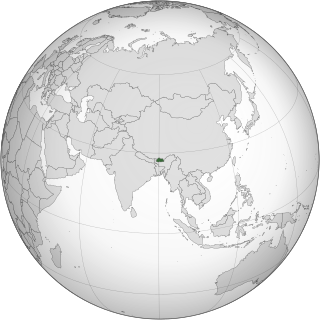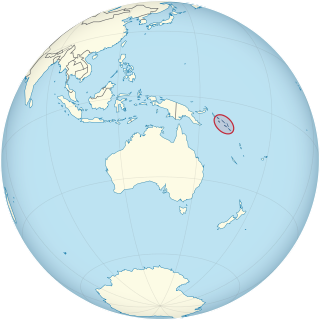 Location of Qatar (dark green) | |
| Medicinal | Illegal |
|---|---|
| Recreational | Illegal |
Cannabis is illegal in Qatar.
A 2000 report by UNODC estimated the prevalence of adult use of cannabis in Qatar to be between 1-.4%, but increasing. [1]
 Location of Qatar (dark green) | |
| Medicinal | Illegal |
|---|---|
| Recreational | Illegal |
Cannabis is illegal in Qatar.
A 2000 report by UNODC estimated the prevalence of adult use of cannabis in Qatar to be between 1-.4%, but increasing. [1]

Cannabis is a genus of flowering plants in the family Cannabaceae. The number of species within the genus is disputed. Three species may be recognized: Cannabis sativa, C. indica, and C. ruderalis. Alternatively, C. ruderalis may be included within C. sativa, all three may be treated as subspecies of C. sativa, or C. sativa may be accepted as a single undivided species. The genus is widely accepted as being indigenous to and originating from Asia.

Cannabidiol (CBD) is a phytocannabinoid discovered in 1940. It is one of 113 identified cannabinoids in cannabis plants, along with tetrahydrocannabinol (THC), and accounts for up to 40% of the plant's extract. As of 2022, clinical research on CBD included studies related to the treatment of anxiety, addiction, psychosis, movement disorders, and pain, but there is insufficient high-quality evidence that cannabidiol is effective for these conditions. CBD is also sold as a herbal dietary supplement promoted with unproven claims of particular therapeutic effects.

Cannabis, also known as marijuana or weed among other names, is a non-chemically uniform drug from the cannabis plant. Native to Central or South Asia, the cannabis plant has been used as a drug for both recreational and entheogenic purposes and in various traditional medicines for centuries. Tetrahydrocannabinol (THC) is the main psychoactive component of cannabis, which is one of the 483 known compounds in the plant, including at least 65 other cannabinoids, such as cannabidiol (CBD). Cannabis can be used by smoking, vaporizing, within food, or as an extract.

Cannabis in Portugal is decriminalized, as a result of the decriminalization of all drugs in Portugal in 2001. Medical use of cannabis was legalized in 2018.
Cannabis in Dominica is a Class B drug to cultivate, sell or possess. This means that possession is punishable by 12 months and EC$12,000 (summary) or 2 years and EC$20,000. Supplying, production, or importation are punishable by 3 years and EC$100,000 (summary) or 14 years and EC$200,000.
Cannabis in Bahrain is illegal. Bahrain's laws forbid the cultivation, sale, and possession of cannabis for recreational purposes. Additionally, the production, sale and possession of any form of medicinal marijuana products is also criminalized, with heavy penalties.

Cannabis in Bhutan is illegal, but grows prolifically in the country and has multiple traditional uses, such as feeding pigs and producing textiles.
Cannabis in Guadeloupe is illegal, but is cultivated and transported illicitly. A 2007 report noted the prevalence of cannabis among youth in Guadeloupe at 7%.
Cannabis in Montserrat, the British Overseas Territory in the Caribbean Leeward Islands, is illegal under British law.

Cannabis in Macau is illegal, but the territory has been used for illicit smuggling of cannabis. Macau is noted, along with Japan, Singapore, and Hong Kong, as an area where cannabis commands a particularly high retail price.

Cannabis in Kyrgyzstan is illegal, but has a long history in the nation, which has been posited as the ancestral homeland of the cannabis plant.

Cannabis is illegal in Vietnam, but is cultivated within the country and is known as cần sa.
Cannabis in Belarus is illegal
Cannabis in Cameroon is illegal; the drug is locally referred to as banga.
Cannabis in Rwanda is legal for medicinal purposes, but illegal for recreational purposes.

Cannabis is illegal in Turkmenistan.
Cannabis etiquette is the set of conventional rules of behavior when consuming cannabis.
Cannabis in Monaco is illegal. The production, sale, and possession of marijuana for medicinal or recreational purposes being a criminal offense with a penalty of up to one year in jail in addition to a fine of up to €1680. Despite the strong laws, the police and courts are often lenient, letting offenders off with a warning.
Cannabis in Haiti is illegal with severe punishments for the production, sale, and possession of marijuana for medicinal or recreational purposes.

Cannabis in the Solomon Islands is illegal for the production, sale, and possession of marijuana for medicinal or recreational purposes. Offenders receive a fine of up to $100,000 or imprisonment of ten years. A 2011 survey of young people, found that 16.1% of males and 11.1% of females had ever used cannabis.